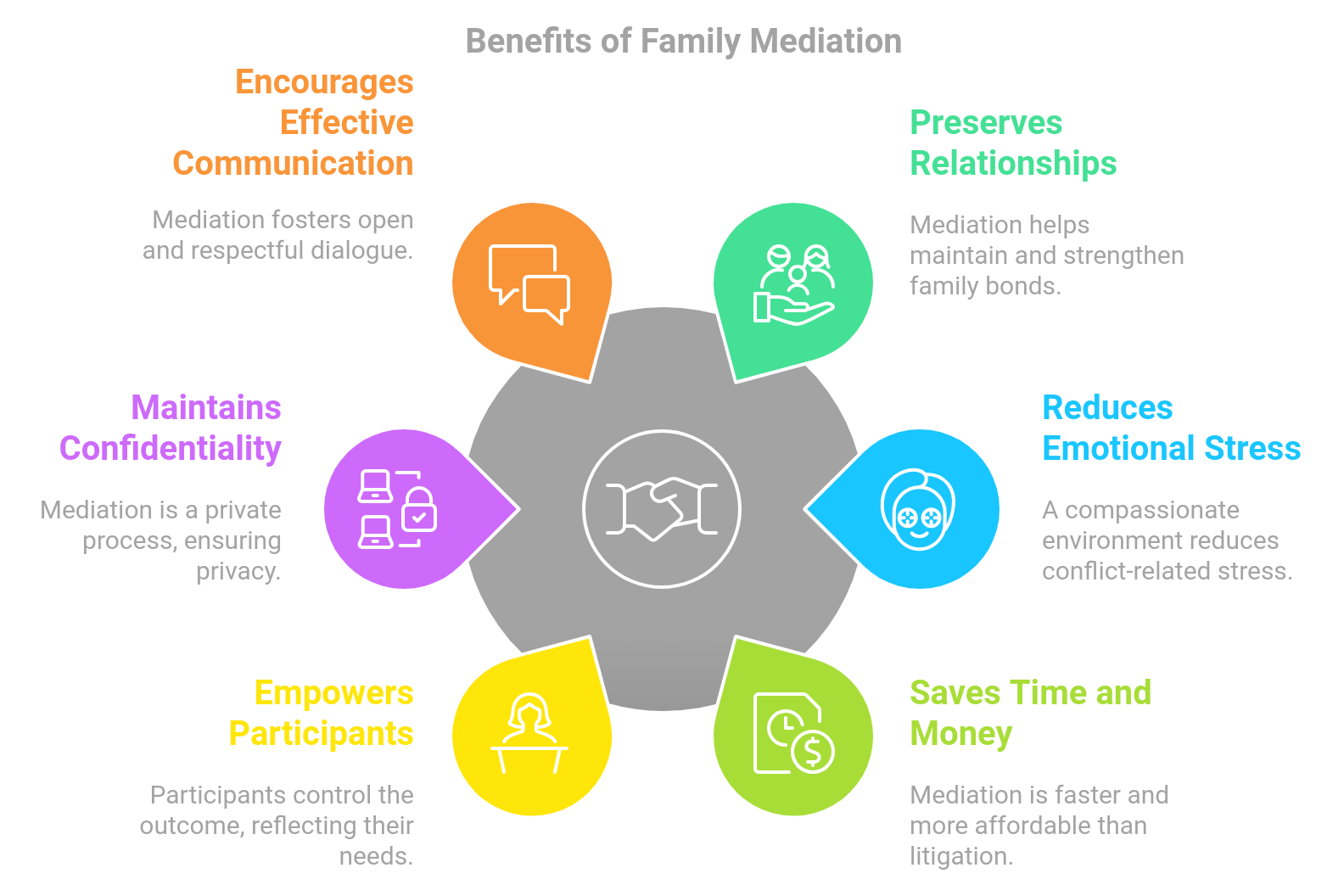Family Mediation
Commercial Mediation
Commercial mediation resolves business disputes efficiently by facilitating negotiations between parties. It covers contract issues, partnership conflicts, and more, promoting collaboration while saving time and costs compared to litigation.
Workplace Risk Assessment
Workplace risk assessment identifies potential hazards, evaluates their impact on employee safety and health, and implements measures to mitigate risks. This process ensures a safer, more compliant, and productive work environment.
Workplace Conflict Resolution
Workplace conflict resolution aims to address disputes between colleagues or teams, focusing on improving communication, fostering collaboration, and creating solutions to issues such as interpersonal disagreements, misaligned goals, or professional misunderstandings.
Third-Party Facilitation
Third-party facilitators assist in ensuring that an individual released on bail complies with the conditions of their release. We can provide support, supervision, and guidance to the accused while they are out on bail.
Family mediation - resolving conflicts with compassion & understanding
Family disputes can be deeply personal and emotionally charged, often involving complex relationships and significant life changes. Whether it’s a divorce, custody disagreement, or a dispute over inheritance, such conflicts can strain even the closest of bonds. Family mediation offers a constructive way to address these challenges, focusing on collaboration and mutual understanding to find solutions that benefit all parties involved.
In contrast to adversarial court proceedings, family mediation prioritizes dialogue, empathy, and practical solutions, enabling families to resolve disputes with dignity and respect. This process not only addresses the immediate issues but also helps build the foundation for healthier relationships in the future.
What Is Family Mediation?
Family mediation is a structured yet flexible process in which a neutral mediator facilitates discussions between family members to resolve disputes. The mediator helps identify common ground, manage emotions, and guide the parties toward mutually acceptable agreements.
Unlike litigation, which imposes a decision through a judge, mediation empowers families to craft solutions tailored to their specific needs. This approach is particularly valuable in emotionally sensitive situations, where preserving relationships and minimizing conflict are paramount.
The scope of family mediation is broad, encompassing issues such as:
- Divorce and separation
- Child custody and parenting plans
- Division of assets and financial matters
- Spousal support or alimony
- Sibling disputes over inheritance
- Elder care and guardianship issues
Family mediation is grounded in principles of neutrality, confidentiality, and voluntary participation, ensuring a safe and supportive environment for dialogue.
The Family Mediation Process
The family mediation process typically unfolds in several stages, each designed to encourage open communication and collaborative problem-solving:
- Initial Consultation: The process begins with an initial consultation, during which the mediator meets with the parties to understand the nature of the dispute, explain the mediation process, and answer any questions. This step ensures that all participants are informed and prepared for the sessions ahead.
- Setting Ground Rules: Before delving into the issues, the mediator establishes ground rules to promote respectful and productive discussions. These rules may include taking turns to speak, avoiding interruptions, and focusing on problem-solving rather than blame.
- Identifying Issues and Interests: The mediator facilitates discussions to identify the key issues in dispute and the underlying interests of each party. By understanding the “why” behind each position, the mediator helps uncover areas of common ground.
- Exploring Options: Through guided discussions, the parties brainstorm potential solutions to address their concerns. The mediator encourages creative thinking, helping participants explore options that they may not have considered independently.
- Negotiating Agreements: Once potential solutions are identified, the mediator assists the parties in negotiating agreements that are fair, practical, and mutually beneficial. These agreements are then documented in writing, and in many cases, can be formalized as legally binding.
- Follow-Up (Optional): In some cases, the mediator may follow up to ensure the agreement is being implemented effectively and to address any additional concerns that may arise.
Benefits of Family Mediation
Family mediation offers numerous advantages, making it an increasingly popular choice for resolving disputes:
- Preserves Relationships: Family disputes often involve close, long-term relationships. Mediation emphasizes collaboration and communication, helping parties maintain or even strengthen these bonds.
- Reduces Emotional Stress: Courtroom battles can be emotionally draining, particularly in sensitive family matters. Mediation provides a more compassionate environment, reducing the stress associated with conflict resolution.
- Saves Time and Money: Mediation is typically faster and more affordable than litigation. By resolving disputes outside of court, families can save on legal fees and minimize disruptions to their lives.
- Empowers Participants: In mediation, the parties retain control over the outcome, crafting agreements that reflect their unique needs and priorities. This contrasts with court rulings, where decisions are imposed by a judge.
- Maintains Confidentiality: Unlike court proceedings, which are often public, mediation is a private process. This confidentiality allows families to address sensitive issues without fear of public scrutiny.
- Encourages Effective Communication: Mediation fosters open and respectful dialogue, teaching participants valuable communication skills that can improve their relationships long after the dispute is resolved.
Common Scenarios for Family Mediation
Family mediation can address a wide range of issues, including:
- Divorce and Separation: Navigating complex issues such as property division, spousal support, and child custody.
- Child Custody and Parenting Plans: Collaborating on arrangements that prioritize children’s best interests.
- Inheritance Disputes: Resolving disagreements over wills, estates, or inheritance.
- Elder Care and Guardianship: Addressing caregiving responsibilities and guardianship decisions.
- Family Business Conflicts: Safeguarding relationships while resolving professional disputes.
Challenges and Limitations of Family Mediation
While family mediation offers many benefits, it is not suitable for every situation. Some challenges include:
- Power Imbalances: May require additional safeguards to ensure fairness.
- Lack of Cooperation: Unwillingness to participate in good faith can hinder success.
- Cases of Abuse: Not recommended in situations involving domestic violence or abuse.
- Non-Binding Nature: Outcomes may not be enforceable unless formalized.
The Role of the Family Mediator
The mediator plays a critical role in guiding the process and ensuring its success. Key responsibilities include:
- Creating a Safe Space: Establishing a neutral environment for discussions.
- Facilitating Communication: Encouraging clear and respectful dialogue.
- Managing Emotions: Navigating emotional dynamics productively.
- Offering Creative Solutions: Helping explore innovative resolutions.
The Growing Popularity of Family Mediation
As families increasingly seek alternatives to litigation, the demand for family mediation continues to rise. Courts in many jurisdictions now encourage or mandate mediation for certain family disputes, reflecting its effectiveness in resolving conflicts outside the courtroom.
Organizations dedicated to family mediation, such as nonprofit centers and private firms, have also expanded their services, making the process more accessible to families of all backgrounds. Additionally, advances in online mediation platforms have enabled families to resolve disputes remotely, further enhancing convenience and flexibility.
Conclusion
Family mediation is a powerful tool for resolving conflicts with compassion, understanding, and efficiency. By prioritizing dialogue and collaboration, mediation empowers families to address their disputes in a way that minimizes stress and preserves relationships.
For families facing challenging situations, mediation offers not only a path to resolution but also an opportunity to build stronger, healthier connections for the future. As more families embrace this approach, the role of mediation in fostering constructive conflict resolution will continue to grow in importance.
Why Choose AHANSA Mediation?
Our Success Stories
Working with AHANSA Mediation Services has been a breath of fresh air. The team is very knowledgeable and responsive. I have really enjoyed the professionalism and the future vision of this group. I know they will continue to accomplish amazing things while holding a very high level of professionalism.
Ashifa is truly exceptional. I have a deep appreciation for her knowledge and expertise. She is dedicated to excellence and her unwavering commitment to her vision were qualities that mirrored my own values as well. I absolutely love working with her on projects and her ability to navigate challenges with poise and grace has set a standard to which I aspire. It's a rare treasure to find a business owner who creates that trust and dedication and I am very excited for what lies ahead.
Working with AHANSA Mediation Center was an absolute pleasure. Their expert Mediators facilitated a smooth process, fostering open dialogue and understanding. Their professionalism, empathy, and commitment to providing conciliation and collaboration are truly commendable. I highly recommend AHANSA Mediation Services for their top-notch expertise and support.
Our Services can be offered in-person or virtually. Interpretation and translation services can be arranged.
Call us at (877) 751-6166 or request a free consultation.

